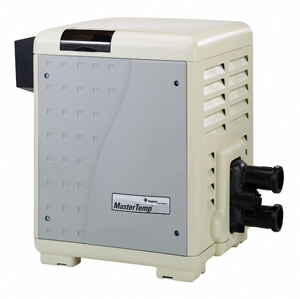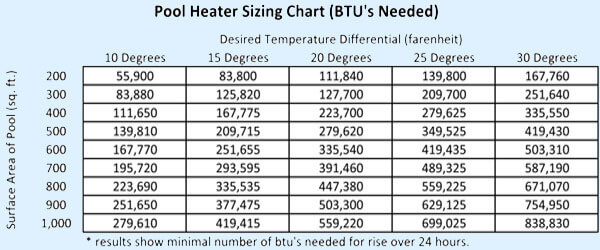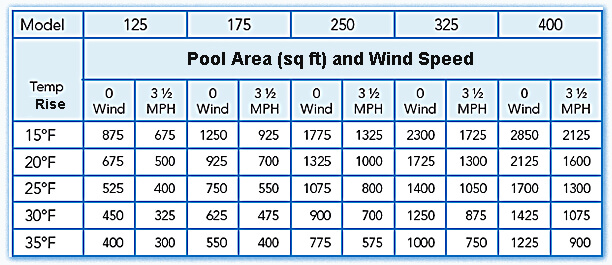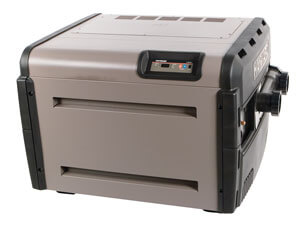10% Off Sitewide Sale + Free Shipping No Minimum*
Gas Swimming Pool Heaters Buyer's Guide
Why Swimming Pool Heaters?
 Before we get into the technicalities of various types of pool heaters available on the market, how about why we need a pool heater in the first place?
Before we get into the technicalities of various types of pool heaters available on the market, how about why we need a pool heater in the first place?
![]() More Comfortable Swimming
More Comfortable Swimming
![]() Greater Use of your Pool
Greater Use of your Pool
![]() Longer Swimming Seasons
Longer Swimming Seasons
Swimming pool heaters use natural gas or propane, to create heat which is passed through a heat exchanger into your pool water, making it all warm and toasty.
A pool heater can add another month or two onto each end of your pool season, and make swimming more enjoyable. When the water is the right temperature, you're more likely to use the pool, and isn't that why you own a pool?
Sizing a Pool Heater
Before you buy a swimming pool heater, it is important to determine the size of your swimming pool to choose a pool heater of the right size. A pool heater that is too small will take days to heat the pool, have much longer run times, and lower overall temperature rise.
Swimming pool heaters are sized to a measurement called BTUs or British Thermal Units. 1 BTU raises the temperature of 1 gallon of water by 1 degree Fahrenheit; the higher the BTUs, the faster the water will heat up. When sized correctly, a gas pool heater will raise the temperature of your pool about 1 degree Fahrenheit per hour.
Calculate Surface Area of your Pool:
Round pools: radius (1/2 diameter) x radius x 3.14
Rectangular pools: length x width
Oval pools: 1/2 length x 1/2 width x 3.14
Kidney pools: length x width x 0.75
Calculate Desired Temperature Rise:
The temperature rise of your pool is a calculation of your desired temperature minus the air temperature, for example if the air is 70 degrees and your desired temperature is 80 degrees, your temperature rise would be 10 degrees. The following table will help you determine how many BTUs it will take to warm your pool water to your desired comfortable level.

Swimming pool heaters are sold in sizes that correspond to their BTU ratings. Most manufacturers offer their heaters in 5-6 sizes - 150K, 200K, 250K... up to 400,000 BTUs.
What About Wind Speed?
Wind - the largest heat thief around, a stiff breeze rolling across your pool surface can quickly accelerate heat loss. Covers and wind blocks such as walls, hedges and fences can reduce the wind pilferage to low amounts. You may not know your wind speed, but you probably know if your pool area is windy or not.

It's considered a good idea to select a heater with higher BTUs than is listed in the manufacturer charts; it will help warm your water faster and will reduce the heater’s running time. And if your pool has an attached spa, you will want fast heat-up times.
Swimming Pool Heater Types
What sets apart gas pool heaters is the type of fuel the heater uses, either natural gas or liquid propane gas (LPG), and their ignition style, either millivolt or electronic start. Gas pool heaters are also available in low-emission and high-altitude models.
Natural Gas or Propane Gas?
If you have natural gas available already, that would be the obvious fuel choice. If you don't, contact local propane suppliers who will sell or lease a propane tank to you, and keep it full with their LPG delivery trucks. You cannot use a 5-gal. BBQ propane tank, sorry. Usually, a 500 gallon tank is installed, either above ground or buried installation.
Millivolt or Electronic?
Millivolt pool heaters have a standing pilot that must stay lit to light the burners, while an Electronic Ignition pool heater eliminates the need for a constant pilot light by electronically lighting the pilot only when needed. Kind of like a modern stove top.
Millivolt pool heaters generate a small amount of electricity (just milli-volts) from a thermopile next to the pilot. This creates 600-750 mv, which is used to power the circuit of wires that runs through the components.
Electronic pool heaters have electronically calibrated and controlled circuitry and switching ability. They are considered to have overall better reliability from their solid-state nature.
Low-N0x or Standard?
If you live in Texas or California, your state government would prefer for you to buy the environmentally friendly, Low-NOx pool heaters. NOx stands for Nitrogen Oxide, one of the emissions from pool heaters, in addition to carbon monoxide. Low-NOx pool heaters have fewer emissions, so they are good for the environment.
Low NOx pool heaters also achieve a better efficiency rating of about 5%, and a higher rate of heat transfer. They are cleaner burning, and a bit safer to install indoors than standard emission heaters. Low NOx heaters typically cost a few hundred dollars more, but over their lifespan, the increased efficiency should pay that back to the owner.
Covered or Uncovered?
Covering the pool, with an automatic cover, solar blanket or liquid solar blanket, will retain 70% or more of the heat that is put into the pool. Cover manufacturers like to say "you wouldn't heat your house without a roof! Don't heat your pool without a cover!"
Yes, covers are great, but they have what I like to call - the 'hassle factor'. Putting the on, taking them off - ugh, who needs it? Liquid solar blankets are very convenient, just pour in the liquid that forms an invisible shield on the surface of the water. And then there's the cost. How much of your heating cost savings are being eaten up - 20%?
Covering the pool can affect heater sizing; a pool that is covered can use a smaller heater size, and can definitely heat the pool for a much lower cost.
Gas Pool Heaters Buyer's Guide
Hayward H-Series Pool Heaters

![]() Low Profile, contoured cabinet
Low Profile, contoured cabinet
![]() "V" baffle design focuses heat
"V" baffle design focuses heat
![]() Induced Draft system controls combustion
Induced Draft system controls combustion
![]() Digital LED control panel and diagnostics
Digital LED control panel and diagnostics
![]() No rear header. Single in/out manifold
No rear header. Single in/out manifold
![]() 80% efficiency
80% efficiency
Pentair MasterTemp Heaters

![]() Space-saving, compact design
Space-saving, compact design
![]() Patented thermostatic bypass valve
Patented thermostatic bypass valve
![]() Dual thermostats for pool or spa
Dual thermostats for pool or spa
![]() CPVC bulkheads are reversible
CPVC bulkheads are reversible
![]() Ceramic fiber insulation holds heat in
Ceramic fiber insulation holds heat in
![]() 82% efficiency
82% efficiency
Raypak Digital Heaters

![]() High wind resistant pagoda top
High wind resistant pagoda top
![]() Digital LCD control panel
Digital LCD control panel
![]() Trim design, Powder-coat finish
Trim design, Powder-coat finish
![]() Stainless steel tube sheet
Stainless steel tube sheet
![]() Capron resin headers
Capron resin headers
![]() 82% efficiency
82% efficiency
Sta-Rite Max-E-Therm Heaters

![]() Exclusive Dura-Glas construction
Exclusive Dura-Glas construction
![]() Control panel rotates to 6 positions
Control panel rotates to 6 positions
![]() LED readout and controls
LED readout and controls
![]() Dual thermostats
Dual thermostats
![]() PVC union connections
PVC union connections
![]() 84% efficiency
84% efficiency
Lochinvar EnergyRite Heaters

![]() Low-N0x emissions surpasses standards
Low-N0x emissions surpasses standards
![]() Gasketless design reduces parts
Gasketless design reduces parts
![]() Rust-free surfaces always looks great
Rust-free surfaces always looks great
![]() Digital display and controls
Digital display and controls
![]() Porcelain molded water surfaces
Porcelain molded water surfaces
![]() 88% efficiency
88% efficiency
Hit the Store!
Now that you have covered the basics and are an expert at how to buy a gas swimming pool heater and what to look for, it is time to go shopping. You can hit a local store or make it more convenient and simple for yourself by checking out our wide selection of pool heaters at low prices, plus free shipping.
If you have questions about swimming pool heaters, reach out to our pool warmth specialists at 800-288-7946. Since we have such a huge selection of pool heater brands, you won't feel pressured into any particular model, just the one that matches you and your pool best!

Ayesha Aslam
InTheSwim Staff Blogger